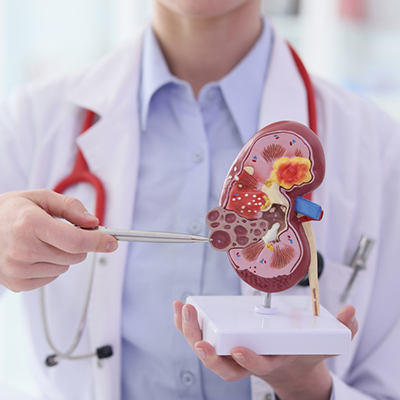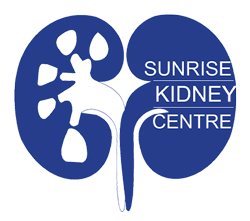Nephrologist in Vijayawada
The kidneys are vital organs performing several crucial functions to maintain overall health. Primarily, they filter waste and excess fluids from the blood, converting them into urine for excretion. This process, known as filtration, helps regulate blood pressure and maintain electrolyte balance by controlling the levels of sodium, potassium, and calcium as per Nephrologist in Vijayawada. Kidneys also produce hormones, including erythropoietin, which stimulates red blood cell production, and renin, which helps regulate blood pressure. They activate vitamin D, essential for bone health, and help maintain the body's acid-base balance. In essence, the kidneys are essential for removing harmful substances, regulating fluid balance, and supporting the production of vital hormones, ensuring proper bodily function and overall well-being.
Maintaining healthy kidneys involves several lifestyle adjustments says Best Nephrologist in Vijayawada. Drink plenty of water in a day. Eat a balanced diet low in sodium, processed foods, and excessive protein, and limit sugary drinks. Regular exercise is crucial for overall health, including kidney care. Manage underlying health conditions like diabetes and high blood pressure, as they can damage kidneys. Avoid excessive use of over-the-counter pain relievers like NSAIDs, which can harm kidney function with overuse. If you have a family history of kidney disease or other risk factors, get regular check-ups to monitor your kidney health and address any potential issues promptly.

Some of the commonly seen kidney diseases at Nephrology Hospital in Vijayawada are:
- Acute Kidney Injury (AKI): A sudden decline in kidney function, often reversible, caused by factors like dehydration, infections, or medications.
- Chronic Kidney Disease (CKD): A progressive and irreversible loss of kidney function over time, leading to waste buildup and potential kidney failure.
- Glomerulonephritis: Inflammation of the glomeruli (kidney's filtering units), leading to protein and blood in the urine. Kidney Specialist in Vijayawada says that this is usually seen due to infections or autoimmune diseases.
- Kidney Stones: Hard deposits that form in the kidneys, causing severe pain when passing through the urinary tract. They can be caused by dietary factors or certain medical conditions.
- Polycystic Kidney Disease (PKD): A genetic disorder characterized by the growth of cysts in the kidneys, impairing their function over time.
- Kidney Infections (Pyelonephritis): Infections of the kidneys, usually caused by bacteria, leading to fever, pain, and urinary symptoms needing help from Nephrologist in Vijayawada.
Understanding stages of kidney failure:
- Stage 1: Kidney Disease with Normal GFR (GFR: 90-120 ml/min) - In this stage, kidney problems have begun, but the GFR is still within the normal range. Symptoms may include high blood pressure and mild proteinuria (excess protein in urine). Proper kidney care can ensure minimum increment.
- Stage 2: Mild Kidney Disease (GFR: 60-89 ml/min) - As kidney damage progresses, the GFR starts to decrease, causing mild kidney problems. Symptoms may include proteinuria, edema (swelling), and elevated creatinine levels.
- Stage 3: Moderate Kidney Disease (GFR: 30-59 ml/min) - In this stage, Best Nephrologist in Vijayawada say that the kidney function is significantly impaired, and symptoms become more pronounced, including fatigue, nausea, and vomiting.
- Stage 3a: Moderate Kidney Disease (GFR: 45-59 ml/min) - This sub-stage is characterized by noticeable decline in kidney function, causing symptoms such as anemia, electrolyte imbalances, and fluid retention.
- Stage 3b: Moderate Kidney Disease (GFR: 30-44 ml/min) - As kidney function worsens, symptoms become more severe, including shortness of breath, fatigue, and muscle cramps.
- Stage 4: Severe Kidney Disease (GFR: 15-29 ml/min) - At this stage, kidney function is severely impaired, causing symptoms such as edema, shortness of breath, and electrolyte imbalances needing immediate treatment from Nephrologist in Vijayawada .
- Stage 5: Kidney Failure (End-Stage Renal Disease) (GFR < 15 ml/min) - In this final stage, kidney function has ceased, requiring patients to undergo dialysis or receive a kidney transplant to sustain life.
Understanding dialysis at Nephrology Hospital in Vijayawada :
Dialysis is a life-sustaining treatment for individuals with severe kidney failure, also known as end-stage renal disease (ESRD) by renal specialist in Vijayawada. It's initiated when the kidneys can no longer adequately filter waste products and excess fluids from the blood, leading to a buildup of toxins that can cause serious health complications. The decision to start dialysis is typically based on a combination of factors, including the patient's symptoms (e.g., fatigue, swelling, nausea), blood test results (specifically, the levels of creatinine and urea), and overall kidney function, often measured by the glomerular filtration rate (GFR). Dialysis may be recommended by Best Nephrologist in Vijayawada when the GFR falls below a certain threshold, usually around 15 mL/min, or if the patient experiences life-threatening electrolyte imbalances or fluid overload. Dialysis treatment continues until kidney function improves (rarely) or until a kidney transplant is performed.
Subtle signs of kidney diseases:
Kidney disease often presents with subtle symptoms, making early detection challenging. Common signs include fatigue, swelling in the feet, ankles, and hands due to fluid buildup, and changes in urination frequency or appearance (foamy, dark, or bloody urine). Other indicators involve persistent high blood pressure, nausea, vomiting, loss of appetite, and itchy skin. Muscle cramps, difficulty sleeping, and shortness of breath can also signal kidney problems. Additionally, individuals with kidney disease might experience decreased mental sharpness, poor concentration, and persistent headaches. Recognizing these diverse symptoms is crucial for timely medical evaluation and treatment. Therefore get in touch with Best Nephrologist in Vijayawada for more.
Factors that contribute to kidney diseases as per renal specialist in Vijayawada
- Family History: Individuals with a family history of kidney disease are more likely to develop it.
- Diabetes and High Blood Pressure: Uncontrolled diabetes and high blood pressure are leading causes of kidney disease.
- Obesity
- Tobacco Use: Smoking and tobacco use can damage kidney function and might not improve even with kidney treatment.
- Poor Diet: Consuming excessive salt, sugar, and fat can contribute to kidney disease.
- Excessive Alcohol Consumption: Drinking too much alcohol can damage kidney function.
- Medications: Certain medications, such as nonsteroidal anti-inflammatory drugs (NSAIDs) can harm kidneys.
- Pesticides and Heavy Metals: Exposure to certain chemicals can cause kidney damage.
Simple tests to determine your kidney function by kidney doctor?
- Blood Tests: These tests measure specific substances in your blood that indicate kidney health and can help develop kidney treatment. The creatinine level reflects the kidney's ability to filter waste, and the blood urea nitrogen (BUN) test measures urea, another waste product. An estimated glomerular filtration rate (eGFR) is calculated from the creatinine level, providing an overall measure of kidney function. Other blood tests suggested by Best Nephrologist in Vijayawada may include electrolyte levels (sodium, potassium, calcium), albumin, and complete blood count (CBC) to assess overall health.
- Urine Tests: Analyzing urine samples can reveal important information about kidney function. A urinalysis checks for protein, blood, sugar, and other substances in the urine by renal specialist in Vijayawada. The presence of protein (proteinuria) in the urine can be a sign of kidney damage. A 24-hour urine collection can also be used to measure the amount of creatinine and protein excreted over a day, providing a more accurate assessment of kidney function.
Is it time to consult Best Nephrologist in Vijayawada ?
- Kidney Stones or UTIs: If you have recurrent kidney stones or severe urinary tract infections, a nephrologist can help prevent future episodes.
- High Blood Pressure or Diabetes: If you have uncontrolled high blood pressure or diabetes, a nephrologist can help manage your condition and prevent kidney damage.
- Kidney Function Decline: If your GFR (glomerular filtration rate) is below 60, indicating reduced kidney function, you should consult a nephrologist.
- Proteinuria or Hematuria: If you notice blood or excess protein in your urine, consult a nephrologist to rule out kidney damage.
- Family History of Kidney Disease: If you have a family history of kidney disease, it's essential to consult a Kidney doctor for early screening and prevention.
- Unexplained Swelling or Weight Gain: If you experience unexplained swelling or weight gain, consult a nephrologist to check for potential kidney problems.
- Dialysis or Transplant: If you require dialysis or are considering a kidney transplant, a nephrologist can guide you through the process.
- Medication-Related Kidney Damage: If you're taking medications that can harm your kidneys, consult a nephrologist to discuss safer alternatives.
- Abnormal Blood Tests: If your blood tests indicate electrolyte imbalances, creatinine levels, or other kidney-related abnormalities, a nephrologist can help interpret the results and develop a kidney treatment plan.
Early consultation with a Nephrologist in Vijayawada can help prevent kidney disease progression, manage symptoms, and reduce the risk of complications. Call now to get an appointment !
FAQ’s to Best Nephrologist in Vijayawada [Frequently Asked Questions]
Is it ok to get a second opinion for your kidney health from Kidney Specialist in Vijayawada ?
Yes, absolutely! Getting a second opinion for your kidney health is a very reasonable and often recommended practice. A second opinion can provide you with a different perspective on your diagnosis, treatment options, and overall care plan. It can help you feel more confident in your decisions and ensure you're receiving the best possible care for your specific situation. Don't hesitate to seek a second opinion, especially if you have complex or concerning kidney issues.
How long is dialysis usually done ?
Dialysis is typically a long-term treatment for kidney failure, and there's no fixed end date. Patients usually continue dialysis for the rest of their lives unless they receive a successful kidney transplant or their health deteriorates to the point where dialysis is no longer beneficial. The frequency of dialysis depends on the type, with hemodialysis typically performed three times a week, while peritoneal dialysis can be done at home daily.
Are family members always a match for kidney transplant ?
No, family members are not always a match for kidney disease. While a family member may be a good match for a kidney transplant, it is not guaranteed. Compatibility depends on blood type and human leukocyte antigen (HLA) matching. Even if a family member is a good match, other factors like overall health and antibody levels can also influence the suitability of a donor.
Can kidney function improve with medication from Kidney Specialist in Vijayawada ?
Yes, kidney function can often improve with medication, especially if the underlying cause of the kidney problem is treatable. Medications can help manage conditions like high blood pressure, diabetes, and autoimmune diseases, which are common contributors to kidney disease. Additionally, certain medications can protect the kidneys from further damage or slow the progression of kidney disease. It's crucial to consult with a healthcare professional to determine the appropriate medications and treatment plan for your specific condition.

